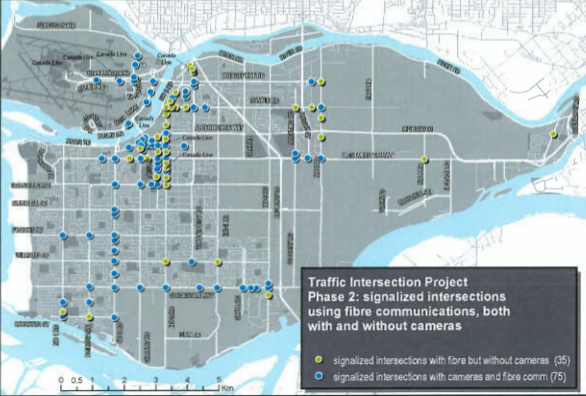New traffic intersection cameras are being installed in Richmond with restrictions set by the Office of the Information and Privacy Commissioner (OIPC) to ensure they’re not used for “generic surveillance.”
While Richmond Mayor Malcolm Brodie said he doesn’t understand why people would object to their photos being taken while out in public, the B.C. Civil Liberties Association (BCCLA) points out the public is allowed a certain level of anonymity – and expect it - even when outside.
The cameras – otherwise known as “closed-circuit TV cameras” (CCTV) - at 110 intersections around Richmond will be set so they don’t capture people’s faces and license plates, and the data will need to be managed by the city, not police, as recommended by the OIPC.
Brodie, however, said when people are driving in a public place, he doesn’t understand their “aversion” to having their picture taken.
“I say if you’re in a public place, you’re in public, it’s just that simple,” Brodie said.
The data, if it had faces and license plates, could be used as evidence of a crime or to watch which route someone took away from a crime.
“I think there are legitimate reasons to have the license plate and the face defined in detail,” Brodie said.
The cameras are meant for traffic management and safety, according to the city, but the data can also be bought by the public.
Meghan McDermott, a staff lawyer with the BCCLA, said the issue of privacy in a public place is not black and white.
However, various court decisions have shown that the public is allowed a certain level of anonymity even while in public.
If faces and license plates weren’t blurred out from traffic camera data, the information could be used maliciously or just for general surveillance by the state, explained McDermott.
“A lot of people live in the very frightening context of having a stalker or an abusive ex, somebody who would go to great lengths to figure out where they are and if they’re with other people,” McDermott said.
In these circumstances, not having anonymity in their daily life is a threat to their safety, and if they knew they were being recorded, they might start changing their behaviour and avoiding some places, she added.
While some argue that if one has nothing to hide, there shouldn’t be a problem being filmed in public.
But McDermott said, in a liberal democracy, knowing that a public entity is “sucking up this information” either to sell - or even give away for free - would be bothersome.
“Just knowing you’re being recorded and knowing the state has access to it would put off a lot of people,” McDermott said, adding it could offend their “sense of who they are in the world.”
She said many people are realizing that online apps are doing a lot of surveillance as well and it’s becoming “quite offensive.”
The Charter of Rights and Freedoms puts the onus of proof on the government when they “choose to infringe our rights,” McDermott said.
Having that information available for anyone to look at “would turn our presumptions of the world on its head,” McDermott said.
The OIPC also recommended the data be handled by the City of Richmond as opposed to the Richmond RCMP.
There are provisions to allow for more surveillance for police investigations and emergencies, for example, in the case of an abduction.
The data will be stored for 30 days.
Seventy of out 180 intersections in Richmond don’t have the fibre optic network to allow the cameras to work.



